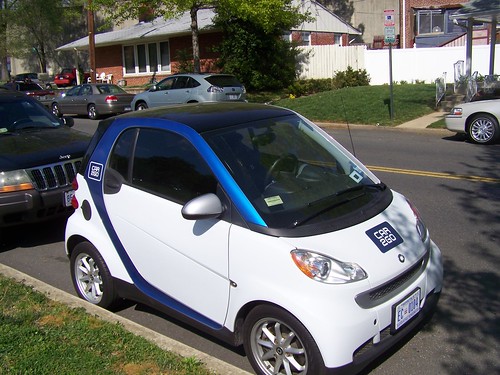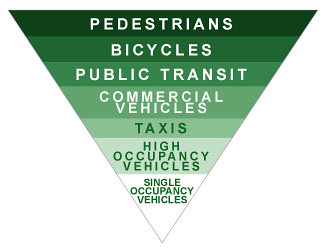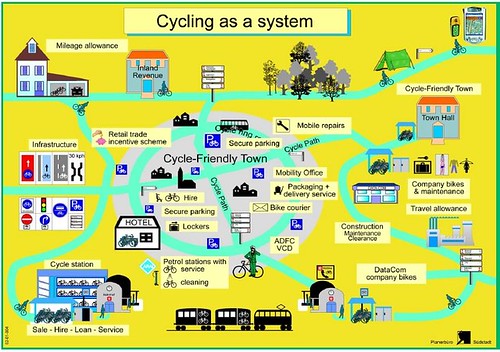Car share users are getting abused by the cities that ostensibly support car sharing as a form of sustainable mobility
For the most part, car owners are privileged by transportation policy at the national, state, and local level.
The ostensible point of car sharing as an element of sustainable mobility (along with walking, biking, transit, bike sharing, taxis/jitney services, and delivery services from the postal service to grocery delivery) is to discourage car ownership and car usage, but to have the option of using cars when needed. Making car sharing expensive and inconvenient encourages car ownership.
Even cities like DC with commitment to sustainable mobility can't help but focus on realizing extranormal ways to generate revenue from such services ("Another example of DC's failures in transportation planning: carsharing"), and prioritize making money off the firms and customers of the service, rather than planning for car sharing as one element in an integrated system within a community's sustainable mobility platform.*
I will admit when I first considered car sharing, back in 2003, I thought that it was important to charge commercial proprietors of such services for their use of the public space to conduct business.
But late in 2005, I changed my tune ("High Cost of Free* Parking Revisited and Car Sharing in DC"), recognizing two things. First, that car-using residents who are car share members shouldn't have to pay significantly more for using street space when compared to car-owning residents, regardless of who owns the service.
 Second, the point of car sharing is to reduce the total number of cars attempting to park in the public space--it's a form of demand management, since research shows that 10-30 households use each car share vehicle, and they own fewer cars compared to similar households that aren't members of car share.
Second, the point of car sharing is to reduce the total number of cars attempting to park in the public space--it's a form of demand management, since research shows that 10-30 households use each car share vehicle, and they own fewer cars compared to similar households that aren't members of car share. In fact, within the past couple weeks, CNN ran a story ("How car-sharing is already helping cities with their transit issues") on a car sharing study out of the University of California, which found that each Car2Go car share vehicle displaced 7 to 11 vehicles that would otherwise have been owned or used by a city's residents.
That's a clear benefit to a community that shouldn't be discouraged, given that center cities are physically constrained places that were not designed to facilitate automobile traffic and car storage.
(Car2Go is a one-way service. Other services, like Zipcar or Enterprise, are two-way and require that cars be returned to the original location. Many people, like us, are members of both types.)
Street use fees. By charging high rates for use of "public space" the users of the service pay much higher prices for the use of space than residents who own their cars. For example, in DC the cost of a residential parking permit is $35/year and many blocks don't require parking permits anyway. (In communities where they pay an annual personal property tax on motor vehicles, like Arlington County, Virginia, it's a different calculation, but nationally, few communities assess such taxes.)
But car sharing users end up paying higher usage fees for each trip because of a city's focus on maximizing revenue from the use of the space by a car sharing vehicle compared to a owned car "stored on the street."
Per trip taxes. I hadn't considered the impact of special taxes on car sharing "rentals" as another form of financial discouragement for car sharing as compared to car owners. Typically, major cities charge high taxes on car rentals and hotel stays as a relatively uncontroversial way to raise revenues, but on non-residents. Unlike traditional rentals, car sharing use is predominated by a city's residents.
A car share user in DC pays an additional 10% fee per trip to the city, beyond the usage fees, which already include payment to the city for the use of street space. This is another instance of privileging car owners over resident car users, as car owners don't pay the equivalent kinds of per trip fees and taxes (although they do on the initial purchase of a car).
Crain's Chicago Business has an op-ed, "Zipcar isn't a sin: why tax it like one?," by Professor Joseph Schwieterman of DePaul University and the University's Chaddick Institute for Metropolitan Development, which conducts a fair amount of research on transportation issues. The Institute just published a study, When Sharing is Taxing: Comparing the Tax Burden on Car-Sharing Services in Major Cities, on city policies towards car sharing including tax rates on use. From the article:
In a recent study I did with my colleagues at DePaul, we found that Chicago is alone among the 12 largest U.S. cities for taxing car-sharing, which we do at more than 20 percent, regardless of the length of the trip. This heavy burden is stifling an industry that can help improve our urban environment. ...Major findings from the study:
In Chicago, car sharers are being punished with taxes almost as high as corporate travelers flying to town on expense accounts and renting luxury sedans. The city saddles drivers with four different taxes that add more than 21 percent to the cost of a quick trip to Ikea. Instead of paying just the base price of around $9.50 hourly, drivers also pay almost two extra dollars in taxes for each hour. Over the course of the year, this can add up to more than $1,000.
When taxes on car rentals were established, few imagined that they would one day affect so many locals who opt to share rather than own
1: Eight of the 12 largest cities impose taxes of 15% or more on all types of reservations (1, 5 and 24-hours), resulting in rates of taxation at least 50% higher than local sales taxes.
-- at least DC, at a 10% tax rate, isn't the most onerous.
2: Nine of the 40 largest cities in the United States impose tax rates of 30% or more on 1-hour reservations. The majority of large cities have tax rates of 15% or more, putting them significantly above each city’s sales tax rate.
3: Even when consumers make a 5-hour carsharing reservation, lessening the effects of lump-sum taxes, tax rates remain 15% or more in most cities. As a result, it is common for users to pay taxes of at least $7 per reservation on these longer trips
4: Tax rates in large U.S. cities rose from an estimated 15.6% in 2011 to 17.0% in 2016.
5: Taxes on carsharing are now higher than almost any other travel-related sector, including hotel rooms and airline tickets. Meanwhile, the median rate of retail tax burden on other notable sectors of the share economy, including Lyft and Uber ridesourcing, is zero.
Once again, residents committed to sustainable mobility are being treated differentially and negatively, compared to car owners, yet one more example of how car ownership is privileged within transportation policy at all levels of government.
=========
* The concept of the sustainable mobility platform is an expansion of earlier writings on the mobility and transit shed. See "Updating the mobilityshed / transit shed concept." I suppose it is an extension of Robert Cervero's use of the term commutershed, and other writings about the distance people are normally willing to walk for transportation, called a walk shed.
The mobility shed is more about sub-district of a city or county, while the transit shed is cross-jurisdictional.
The concept of the sustainable mobility platform is an example of what some researchers call a "product-service system," here focused on sustainable mobility.
Relevant graphic expressions include:
The mobility shed concept

The sustainable transportation hierarchy by Transportation Alternatives

The idea of a complete platform supporting cycling, from the 2002-2012 German National Bicycle Plan

Labels: car culture and automobility, car sharing, sustainable mobility platform, transportation planning, urban design/placemaking




12 Comments:
car2go left Miami because of the competition with Uber and that car rental tax.
the $1 per trip insurance fee is also something cities need to address.
I'm not happy about the insurance fee, but it's probably somewhat comparable to the different pricing tiers for the new bike share in LA. $40 + $1.75 per trip, or $20/mo. and no additional trip fee.
Judging by the damage I've seen on some of the cars, I imagine their losses from accidents is higher than they expected, but to raise the base annual membership fee or the per minute price is seen as counterproductive, higher than what market research says is a reasonable price.
... therefore the insurance fee as the lesser evil.
2. Didn't know about Miami.
http://www.miamiherald.com/news/local/community/miami-dade/article55953225.html
Hoboken had an issue with state rental taxes and their intent to utilize car share as a parking supply mechanism too.
Also Car2Go pulled back on their home zone and number of cars in Minneapolis.
http://www.startribune.com/map-car2go-proposes-smaller-minneapolis-service-area/368669371/
I think that these services work best in places with a robust foundation for what I am calling the sustainable mobility platform or product-service system.
Miami does have rail-based transit, but I don't think it is highly used. You need density etc. and other ways to get around. The article said they had 32,000 members but not a lot of use... ?
we mostly use car2go at night or on weekends. For daily travel by myself I bike...
The problem with the insurance fee is it favors a suburban or outer zone usage.
My xar2go trios usually are around $3 before the fee.
It would be interesting to know what is the difference in trip time between core and outer city trips. Our trips tend to be less than 15 minutes--the longest was to the Airport/Crystal City, which is an outlier that doesn't count, a function of it being before 5:30am.
But for me, the motivator has always been that a car2go trip will be cheaper than a taxi based on the distance we're going.
The UC study mentioned in the CNN article was given access to Car2Go trip data and the study was funded by Daimler.
I think the $1 fee is a disincentive regardless. But yes, on the shortest trips, it's even more glaring.
I think the DePaul study is very important because it calls attention to the dichotomy.
Although I don't expect professors outside of urban sociology to start talking about how car owner use of space is privileged over resident car share users...
I don't know. We never had carshare when we were carless in DC from '12 to '14. But then we moved to LA and Zipcar is essential for social things like going camping a couple times a year... price is great and not having to deal with obnoxious car rental people rules! Sometimes cars are a lil dirty or somewhat broken (despite low mileage) or otherwise annoying. But still works well tho
maybe the headline is unclear. The problem isn't with car share but the way that cities are taxing trips, charging for use of public space in ways that end up being unfair to users, who are also city residents, in a way that continues the privileging of car ownership by residents.
I think two way car share is awesome so long as you are not someone who "must" drive every day.
For us, one way carshare especially has been great for short trips, say you end up buying stuff spur of the moment that you hadn't planned on doing, and bus-based transportation doesn't work. (and for trips of two people as opposed to singleton trips by me on a bike -- a two person car2go trip is about the same cost as two people taking Metrorail, but much faster, more direct, don't have to wait for trains, and a walk to the final destination and to the station originally)
But that doesn't work for bigger stuff, e.g., getting filing cabinets etc. or trips outside the city. Zipcar is cool because of the variety of vehicles they have, including vans and pickups.
... it happens that S is a USAA member and they have a special deal with Hertz, so we can get great car rental rates. ... but, the best rates are at National Airport, not in-city locations, so that requires a special trip that might not be practical in a place like LA.
Another point is that Uber, by introducing more taxi service into roads, has made driving and rdiding a bike far worse. Cars constantly pulling over at bad spaces, u turns, drifting around not looking on the road.
car2go is far from perfect, but the drivers tend to act like normal cars.
the only real complaint I have is car2go using "full size" parking spaces with meters. I like meters, they are easier to use than multispace, but frustrating to see car2gos there. The problem, of course, is the size of the parking space.
(I'm coming to the conclusion that the problem isn't cars but the SIZE of cars in cities. Various european initiatives (thing engine size, weight, carbon etc) reduces european cars by 1/2.
no I'm gonna have to disagree, in cities the problem is the number of cars more generally. Size is but one issue. Smaller cars mitigates the problem a little. The problem is in consumer behavior. When people own fewer cars/household, they buy for their maximum need, hence SUV type vehicles, not a Ford Focus.
e.g., in Nature of Economies, JJ recounts being asked "why aren't there enough roads?" Her response was that was the wrong question. The right question being "why are there so many cars?"
The great thing about car sharing, even taxis is it allows us to use cars when we need to without having to own them. Something you know.
... the thing about Uber etc. is that it promotes race to the bottom and over use of cars, bad behavior, etc. To maximize their limited income, they drive recklessly (looking at the screen for fares, etc.).
and Uber/Lyft is like how DC law allows for the creation of charter schools without any connection to demand/student enrollment.
Yes, there is more demand for taxi services than was met by taxis, partly because of market failures, greater risk of trips to impoverished communities resulting in fewer taxis willing to go there, etc.
But the total demand is less than Uber/Lyft/etc. + taxis.
Uber can only succeed with its low fares by using desperate drivers and using capital investment to fund losses. That's anti-market.
... um, but I agree with you about a problem of SmartCars not being able to use space more efficiently.
and in our 2001 planning initiative in H St., we suggested to the city that parking permit prices be more for larger vehicles, and for add'l permits/household.
issues in Toronto with car2go
http://www.metronews.ca/views/toronto/torys-toronto-matt-elliott/2016/08/08/car-parking-cant-stand-in-the-way-of-car-sharing-in-toronto-.html
Hi,
Thanks for sharing a nice article, Planning to purchase a Car and sort of money, Claim your Instant car loan online up to 15,00,000 with the least documentation. And, get Instant car loan with a low-interest rate at Buddy Loan in India. Apply now: https://www.buddyloan.in
Place Where? Details
Fiorito 5555 NE 2nd Ave This establishment specializes in Argentinean cuisine and is perfect for an informal dinner. The incredible steaks with fried potatoes and spicy sauce will impress your taste buds. In addition, the prices on the menu are pretty good.
The Salty Donut 50 NW 23rd Ave # 112 Want to have a really delicious breakfast? Then you’re welcome! Many gluten-free and vegan options, along with low prices (starting at $4), make this place the best donut shop in Miami.
KYU 251 NW 25th St This is an Asian restaurant, which can hardly be called typical due to the special approach to cooking. Here you will try really tasty delicacies from the chef: fried ribs, coconut cake, and many other specialties are waiting for you at KYU.. More information read here: can i rent a car at 22 . can a 23 year old rent a car
Post a Comment
<< Home